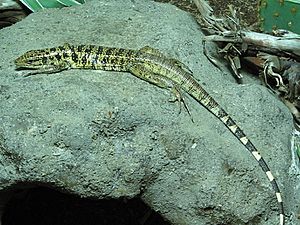Teiidae facts for kids
Quick facts for kids Teiidae |
|
|---|---|
 |
|
| Tupinambis teguixin | |
| Scientific classification |
|
| Kingdom: | Animalia |
| Phylum: | Chordata |
| Class: | Reptilia |
| Order: | Squamata |
| Superfamily: | Lacertoidea |
| Family: | Teiidae Gray, 1827 |
| Genera | |
|
18, See text. |
|
Teiidae is a family of lizards that live in the Americas. You might know them as whiptails or racerunners. Some bigger lizards called tegus also belong to this family.
There are about 150 different kinds of Teiidae lizards. They are grouped into eighteen genera (which is the plural of genus, a way to group similar animals).
What Teiids Look Like and How They Act
Teiids have some special features that help you tell them apart from other lizards. They have large, rectangular scales on their bellies. Their backs are covered in smaller, bumpy scales.
Their head scales are separate from the bones in their skull. Also, their teeth are strong and attached firmly to their jawbones. All teiids have a tongue that splits into two parts, just like a snake's tongue. They also have strong, well-developed legs.
Most teiids live on land, but a few can live partly in water. They are active during the day, which means they are diurnal. They mainly eat meat, like insects or other small animals.
These lizards are very active hunters. They move quickly between places to hide while looking for food. Some teiids might also eat a small amount of plants. They are oviparous, meaning they lay eggs. Some species lay many eggs at once!
How Some Teiids Reproduce
Some types of whiptail lizards are quite special. They are all female, and there are no known males for these species.
These female lizards can have babies all by themselves! This special way of having offspring is called parthenogenesis. It means they can reproduce without a male.
Types of Teiids
The Teiidae family has about 150 different species. These are divided into two main groups, called subfamilies, and then into 18 smaller groups, or genera.
Here are some of the genera (groups) of Teiidae lizards:
- Subfamily Teiinae:
- Ameiva – called junglerunners (14 species)
- Ameivula – (11 species)
- Aspidoscelis – North American whiptail lizards (46 species)
- Aurivela – (2 species)
- Cnemidophorus – South American whiptail lizards (19 species)
- Contomastix – (6 species)
- Dicrodon – desert tegus (3 species)
- Glaucomastix – (5 species)
- Holcosus – (18 species)
- Kentropyx – (9 species)
- Medopheos – (1 species)
- Pholidoscelis – (20 species)
- Teius – (3 species)
- Subfamily Tupinambinae:
- Callopistes – false monitors (4 species)
- Crocodilurus – the crocodile tegu (1 species)
- Dracaena – caiman lizards (3 species)
- Salvator – (3 species)
- Tupinambis – tegus (8 species)
See also
 In Spanish: Teíidos para niños
In Spanish: Teíidos para niños
 | Georgia Louise Harris Brown |
 | Julian Abele |
 | Norma Merrick Sklarek |
 | William Sidney Pittman |

